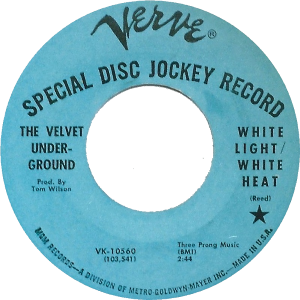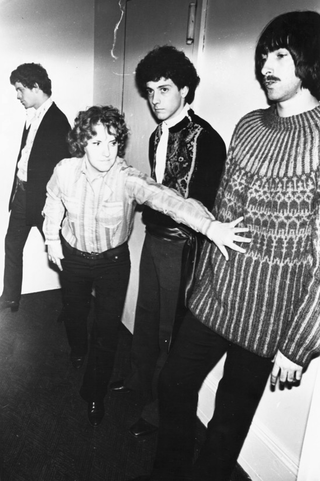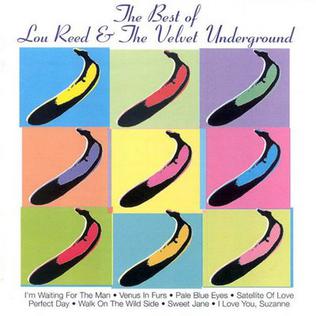
Lewis Allan Reed was an American musician and songwriter. He was the guitarist, singer, and principal songwriter for the rock band The Velvet Underground and had a solo career that spanned five decades. Although not commercially successful during its existence, the Velvet Underground came to be regarded as one of the most influential bands in the history of underground and alternative rock music. Reed's distinctive deadpan voice, poetic and transgressive lyrics, and experimental guitar playing were trademarks throughout his long career.

Christa Päffgen, known by her stage name Nico, was a German singer, songwriter, actress, and model. She had roles in several films, including Federico Fellini's La Dolce Vita (1960) and Andy Warhol's Chelsea Girls (1966). Reviewer Richard Goldstein describes Nico as "half goddess, half icicle" and writes that her distinctive voice "sounds something like a cello getting up in the morning."

The Velvet Underground & Nico is the debut studio album by the American rock band The Velvet Underground in collaboration with the German singer Nico, released in March 1967 through Verve Records. It was recorded in 1966 while the band were featured on Andy Warhol's Exploding Plastic Inevitable tour, and was produced by Warhol, with the album featuring a record sleeve that he designed. The album features elements of avant-garde music incorporated into brash, minimal and groove-driven rock music, with frontman Lou Reed delivering explicit lyrics spanning themes of drug abuse, prostitution, sadomasochism and sexual deviancy.

John Davies Cale is a Welsh musician, composer, and record producer who was a founding member of the American rock band the Velvet Underground. Over his six-decade career, Cale has worked in various styles across rock, drone, classical, avant-garde and electronic music.

The Velvet Underground is the third studio album by the American rock band the Velvet Underground. Released in March 1969 by MGM Records, it was their first record with multi-instrumentalist Doug Yule, who replaced previous member John Cale. Recorded in 1968 at TTG Studios in Los Angeles, California, the album's sound—consisting largely of ballads and straightforward rock songs—marked a notable shift in style from the band's previous recordings. Lead vocalist Lou Reed intentionally did this as a result of their abrasive previous studio album White Light/White Heat (1968). Reed wanted other band members to sing on the album; Yule contributed lead vocals to the opening track “Candy Says” and the closing track "After Hours" is sung by drummer Maureen Tucker.

White Light/White Heat is the second studio album by the American rock band the Velvet Underground. Released on January 30, 1968, by Verve Records, it was the band's last studio album with multi-instrumentalist and founding member John Cale. Recorded after band leader Lou Reed fired Andy Warhol, who had produced their debut album The Velvet Underground & Nico, they hired Steve Sesnick as a manager and hired producer Tom Wilson, who had worked on the band's debut. White Light/White Heat was engineered by Gary Kellgren.

Noise rock is a noise-oriented style of experimental rock that spun off from punk rock in the 1980s. Drawing on movements such as minimalism, industrial music, and New York hardcore, artists indulge in extreme levels of distortion through the use of electric guitars and, less frequently, electronic instrumentation, either to provide percussive sounds or to contribute to the overall arrangement.

Holmes Sterling Morrison Jr. was an American guitarist, best known as one of the founding members of the rock band the Velvet Underground, usually playing electric guitar, occasionally bass guitar, and singing backing vocals.

The Best of The Velvet Underground: Words and Music of Lou Reed is a compilation album by The Velvet Underground. It was released in October 1989 by Verve Records.
"Sister Ray" is a song by the Velvet Underground that closes side two of their 1968 album White Light/White Heat. The lyrics are by Lou Reed, with music composed by John Cale, Sterling Morrison, Maureen Tucker and Reed.
White Light may refer to:
"The Gift" is the second track that appears on White Light/White Heat, the 1968 second album by the Velvet Underground. The song is over eight minutes long and, in the stereo version, mixed in such a way that a short story can be heard in the left speaker, while a rock instrumental is heard on the right.

Songs for Drella is a 1990 studio album by Lou Reed and John Cale, both formerly of the Velvet Underground; it is a song cycle about Andy Warhol, their mentor, who had died following routine surgery in 1987. Drella was a nickname for Warhol coined by Warhol superstar Ondine, a contraction of Dracula and Cinderella, used by Warhol's crowd but never liked by Warhol himself. The song cycle focuses on Warhol's interpersonal relations and experiences, with songs falling roughly into three categories: Warhol's first-person perspective, third-person narratives chronicling events and affairs, and first-person commentaries on Warhol by Reed and Cale themselves. The songs, in general, address events in their chronological order.

"White Light/White Heat" is a song recorded by the American rock band the Velvet Underground. It was released as a single in late November 1967 with the B-side "Here She Comes Now". The following year it appeared as the title track on their second studio album of the same name.
"Venus in Furs" is a song by the Velvet Underground, written by Lou Reed and originally released on the band's 1967 debut album The Velvet Underground & Nico. Inspired by the book of the same name by Leopold von Sacher-Masoch, the song includes sexual themes of sadomasochism and bondage.

"Here She Comes Now" is a song released by the American rock band the Velvet Underground in January 1968, from their second studio album White Light/White Heat. As the shortest song on the album, the performance and mix of the song are both considered simple and traditional, making it somewhat distinct from the other five songs on the album, all of which contain some degree of experimental or avant-garde elements in terms of sound.

The discography of the American rock band The Velvet Underground consists of five studio albums, six live albums, 14 compilation albums, six box sets and eleven singles.
"Stephanie Says" is a song by American band the Velvet Underground, originally recorded in 1968. Although available on various bootlegs, the song was not released officially until 1985 when a remixed version appeared on the album VU, and subsequently on the 1995 box set Peel Slowly and See. The original 1968 mix of "Stephanie Says" was included on the 2005 Velvet Underground compilation album Gold.

The Best of Lou Reed & The Velvet Underground is a compilation of some of Lou Reed's and some of The Velvet Underground's songs. It was released in 1995, but not in the U.S.

The Velvet Underground was an American rock band formed in New York City in 1964. It originally comprised singer and guitarist Lou Reed, Welsh multi-instrumentalist John Cale, guitarist Sterling Morrison, and drummer Angus MacLise. In 1965, MacLise was replaced by Moe Tucker, who played on most of the band's recordings. Though their integration of rock and the avant-garde resulted in little commercial success, they are now widely regarded as one of the most influential bands in rock, underground, experimental, and alternative music. Their provocative subject matter, musical experiments, and nihilistic attitude was also instrumental in the development of punk rock, new wave and several other genres.














